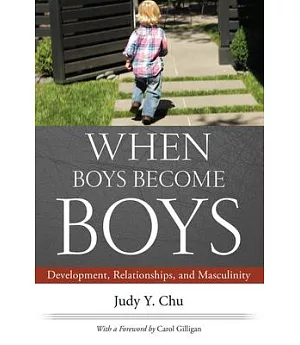"When Judy Y. Chu first encountered the four-year-old boys we meet in this book, they were experiencing a social initiation into boyhood. They were initially astute in picking up on other
people's emotions, emotionally present in their relationships, andcompetent in their navigation of the human social world. However, the boys gradually appeared less perceptive, articulate, and
responsive, and became more guarded and subdued in their relationships as they learned to prove that they are boys primarily byshowing that they are not girls. Based on a two-year study of boys
aged four to six, When Boys Become Boys offers a new way of thinking about boys' development. Chu finds that behaviors typically viewed as "natural" for boys reflect an adaptation to cultures
that require boys to be emotionally stoic, competitive, and aggressive if they are to be accepted as "real boys." Yet even as boys begin to reap the social benefits of aligning with norms of
masculine behavior, they pay a psychological and relational price for hiding parts of their authentic selves. Through documenting boys' perceptions of the obstacles they face and the pressures
they feel to conform, and showing that their compliance with norms of masculine behavior is neither automatic nor inevitable, this accessible and engaging book provides insight into ways in
which adults can foster boys' healthy resistance and help them to access a broader range of options for expressing themselves"--





















